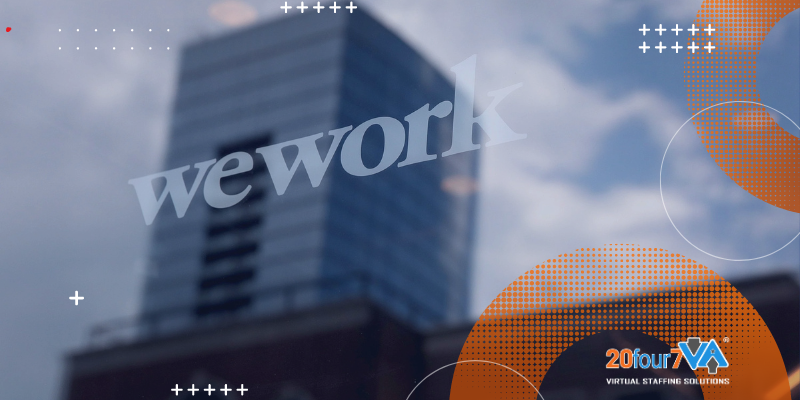WeWork Has Filed for Bankruptcy Protection

WeWork was once valued at $47 billion just four years ago and was considered one of the top startups in the United States. It’s understandable how the story of its rise—and almost inevitable fall—has captured the interest of the business world, Hollywood, and everyone in between. While speaking at a TechCrunch Disrupt event, WeWork founder and disgraced ex-CEO Adam Neumann mentioned the intention was to “change the world.” In a way, Neumann brought it to fruition, just not in the way he probably imagined.
The start and rise of WeWork Cofounders
Neumann and Miguel McKelvey founded WeWork in 2010. The first WeWork location is in SoHo, Manhattan. From there, it has received investments from the likes of J.P. Morgan Chase & Co., Goldman Sachs, and most notably, SoftBank. All that funding enabled the startup to expand alarmingly fast, opening over 200 locations in a span of 6 years.
During its existence, WeWork has managed to basically become synonymous with the term coworking space. But it also managed to burn more money than it was earning. From large-scale annual summer camps and Neumann’s lavish lifestyle to questionable leadership and long-term lease contracts, it seemed like the company was doomed from the get-go.
WeWork files for bankruptcy
Just last month, after an IPO failure in 2019, a public ousting of ex-CEO Adam Neumann, and a tumultuous (for everyone) pandemic, WeWork filed for bankruptcy in the US and Canada. In an initial filing, they reported almost $19 billion in total debts. On top of that, the company also reported nearly $100 million in unpaid rent. While the 98% drop in share prices and company debts are mind-blowing, the effects are also too real for real people. Thousands of employees were laid off by the company. To lose a job is a challenge. But to lose it in this unfavorable market? The pressure and stress are simply difficult to imagine.
What does WeWork really offer?
Despite the convincing efforts of Neumann and his team to taut WeWork as a tech startup, it was far from the truth. Neumann’s eccentric ways and Silicon Valley talk made it easy for people, even Wall Street bigshots, to think WeWork was more than it really was—a real estate company.
At its core, they rent and convert big office spaces and then rent them out to clients. Sure, this doesn’t sound as fancy as what the ex-CEO described it to be, but when done well, this model could work (or, in WeWork’s case, could have).
But to WeWork’s credit, it did become an excellent space for like-minded individuals—from startup founders to freelancers—to connect. In a way, WeWork was able to deliver on some fronts. Sadly, these pockets of success couldn’t improve the tragic story that WeWork’s leaders were writing. No amount of investment or trust could make up for the way the company was being managed.
Factors Outside of Work Continue to Affect Women
Internal factors, including lack of support for women’s well-being and non-inclusive practices, are hurdles that women face in the workplace every day. But they’re not the only challenges. Factors outside of work also tend to take a toll on women and their careers.
At home, traditional gender roles still persist despite women also pursuing their own careers. Almost half (46%) of the respondents who live with a partner and have children say they take on most of the child-rearing responsibilities. And when it comes to cleaning and other domestic tasks, 42% of women say they handle most of the domestic workload.
Aside from household work, a third (37%) of the respondents share that they feel the need to prioritize their partners’ careers over their own. This type of thinking can be dangerous, as it can perpetuate a vicious cycle. When women let their careers take a backseat to prioritize their partner’s professional advancement, their chances of earning more will continue to lessen.
A cautionary tale on smoke, mirrors, and too much hype
Most could say that Neumann, even with a public ousting, left WeWork almost unscathed. But the rise and scary fall of the company should still serve as a cautionary tale for all businesses.
Yes, having a considerable amount of hype can be great for business. However, that shouldn’t be the only thing propping you up. At the very least, you need a sound business plan, transparent leadership, and data-driven decision-making.
It’s not as exciting as flying on a luxurious private jet or multiple magazine cover stories, but it can lead to sustainable growth. And in these challenging times, that’s more valuable than hype.
The future of coworking spaces
Despite the crash of WeWork, the demand for coworking spaces is still there. The workplace is still evolving. More and more organizations are embracing hybrid and fully remote work. Clients are still looking for the flexibility, community, and convenience that coworking spaces offer.
WeWork has left a significant gap in the coworking space industry. And other competitors are poised to fill that gap as long as they avoid the pitfalls of the fallen company.











